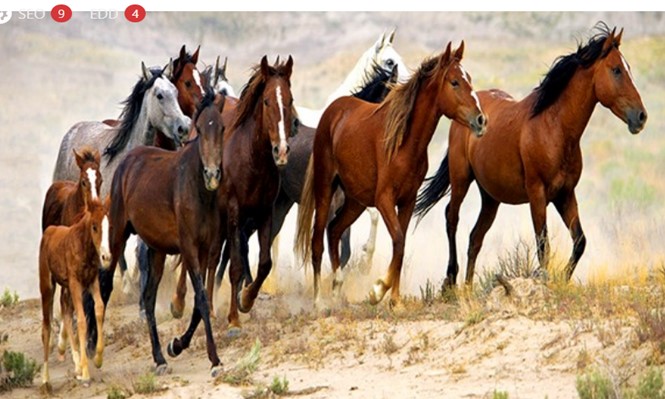The Art of Taming and Training Wild Horses
The first domestication of the horse, one of the greatest achievements of man in the animal kingdom, was not the work of a day; but like all other great accomplishments, was brought about by a gradual process of discoveries and experiments.
He first subdued the more subordinate animals, on account of their being easily caught and tamed, and used for many years the mere drudges, the ox, the ass, and the camel, instead of the fleet and elegant horse.
This noble animal was the last brought into subjection, owing, perhaps, to man’s limited and inaccurate knowledge of his nature, and his consequent inability to control him. This fact alone is sufficient evidence of his superiority over all other animals.
Man, in all his inventions and discoveries, has almost invariably commenced with some simple principle, and gradually developed it from one degree of perfection to another.
The first hint that we have of the use of electricity was Franklin’s drawing it from the clouds with his kite. Now it is the instrument of conveying thought from mind to mind, with a rapidity that surpasses time.
The great propelling power that drives the wheel of the engine over our land, and ploughs the ocean with our steamers, was first discovered escaping from a tea-kettle. And so, the powers of the horse, second only to the powers of steam, became known to man only as experiments, and investigation revealed them.
The horse, according to the best accounts we can gather, has been the constant servant of man for nearly four thousand years, ever rewarding him with his labor and adding to his comfort in proportion to his skill and manner of using him; but being to those who govern him by brute force, and know nothing of the beauty and delight to be gained from the cultivation of his finer nature, a fretful, vicious, and often dangerous servant; whilst to the Arabs, whose horse is the pride of his life, and who governs him by the law of kindness, we find him to be quite a different animal.
The manner in which he is treated by a foal gives him an affection and attachment for his master not known in any other country. The Arab and his children, the mare and her foal, inhabit the tent together; and although the foal and the mare’s neck are often pillows for the children to roll upon, no accident ever occurs, the mare being as careful of the children as of the colt.
Such is the mutual attachment between the horse and his master, that he will leave his companions at his master’s call, ever glad to obey his voice.
And when the Arab falls from his horse, and is unable to rise again, he will stand by him and neigh for assistance; and if he lays down to sleep, as fatigue sometimes compels him to do in the midst of the desert, his faithful steed will watch over him, and neigh to arouse him if man or beast approaches.
The Arabs frequently teach their horses secret signs or signals, which they make use of on urgent occasions to call forth their utmost exertions. These are more efficient than the barbarous mode of urging them on with the spur and whip, a forcible illustration of which will be found in the following anecdote.
A Bedouin, named Jabal, possessed a mare of great celebrity. Hassad Pacha, then Governor of Damascus, wished to buy the animal, and repeatedly made the owner the most liberal offers, which Jabal steadily refused.
The Pacha then had recourse to threats, but with no better success. At length, one Gafar, a Bedouin of another tribe, presented himself to the Pacha, and asked what he would give the man who should make him master of Jabal’s mare? “I will fill his horse’s nose-bag with gold,” replied Hassad.
The result of this interview having gone abroad; Jabal became more watchful than ever, and always secured his mare at night with an iron chain, one end of which was fastened to her hind fetlock, whilst the other, after passing through the tent cloth, was attached to a picket driven in the ground under the felt that served himself and wife for a bed.
But one midnight, Gafar crept silently into the tent, and succeeded in loosening the chain. Just before starting off with his prize, he caught up Jabal’s lance, and poking him with the butt end, cried out: “I am Gafar! I have stolen your noble mare, and will give you notice in time.” This warning was in accordance with the customs of the Desert; for to rob a hostile tribe is considered an honorable exploit, and the man who accomplishes it is desirous of all the glory that may flow from the deed.
Poor Jabal, when he heard the words, rushed out of the tent and gave the alarm, then mounting his brother’s mare, accompanied by some of his tribe, he pursued the robber for four hours.
The brother’s mare was of the same stock as Jabal’s but was not equal to her; nevertheless, he outstripped those of all the other pursuers, and was even on the point of overtaking the robber, when Jabal shouted to him: “Pinch her right ear and give her a touch of the heel.” Gafar did so, and away went the mare like lightning, speedily rendering further pursuit hopeless.
The _pinch in the ear_ and the _touch with the heel_ were the secret signs by which Jabal had been used to urge his mare to her utmost speed. Jabal’s companions were amazed and indignant at his strange conduct. “O thou father of a jackass!” they cried, “thou hast helped the thief to rob thee of thy jewel.”
But he silenced their upbraidings’ by saying: “I would rather lose her than sully her reputation. Would you have me suffer it to be said among the tribes that another mare had proved fleeter than mine? I have at least this comfort left me, that I can say she never met with her match.”
Here is What You Will Learn Inside…
![]() The Three Fundamental Principles of My Theory
The Three Fundamental Principles of My Theory
![]() How to Succeed in Getting the Colt from Pasture
How to Succeed in Getting the Colt from Pasture
![]() How to Stable a Colt Without Trouble
How to Stable a Colt Without Trouble
![]() Time to Reflect
Time to Reflect
![]() The Kind of Halter
The Kind of Halter
![]() Remarks on the Horse
Remarks on the Horse
![]() Experiments with the Robe
Experiments with the Robe
![]() Suppositions on the Sense of Smelling
Suppositions on the Sense of Smelling
![]() Prevailing Opinion of Horsemen
Prevailing Opinion of Horsemen
![]() Powell’s System of Approaching the Colt
Powell’s System of Approaching the Colt
![]() Remarks on Powell’s Treatment How to Govern Horses of Any Kind
Remarks on Powell’s Treatment How to Govern Horses of Any Kind
![]() How to Proceed if Your Horse is of a Stubborn Disposition
How to Proceed if Your Horse is of a Stubborn Disposition
![]() How to Halter and Lead the Colt
How to Halter and Lead the Colt
![]() How to Lead a Colt by the Side of a Broken Horse
How to Lead a Colt by the Side of a Broken Horse
![]() How to Lead a Colt into the Stable and Hitch Him Without Having Him Pull on the Halter
How to Lead a Colt into the Stable and Hitch Him Without Having Him Pull on the Halter
![]() The Kind of Bit and How to Accustom a Horse to It
The Kind of Bit and How to Accustom a Horse to It
![]() How to Saddle a Colt
How to Saddle a Colt
![]() How to Mount the Colt
How to Mount the Colt
![]() + Much More….
+ Much More….
Our 100% Money Back Guarantee:
 Try it Risk Free Today! If you purchase today, your purchase is 100% guaranteed.
Try it Risk Free Today! If you purchase today, your purchase is 100% guaranteed.
After reading the eBook and you are not satisfied just ask and I will be glad to give you a full refund.
All purchases may be refunded within 30 days of purchase, meaning that if you think your new eBook is not as good as I claim, you will get every cent you paid back.

If for any reason you decided within 30 days that “The Art of Taming and Training Wild Horses” is not for you, simply notify us by email and we will gladly refund your money – no questions asked. That is our Ironclad Guarantee!
The risk is entirely ours! You absolutely have nothing to lose!
Click on the Buy Button Below for Instant Access! Only 9.99
Regards, Coyalita
Copyright © 2021-2023 1-stop-sporting-goods.com All Rights Reserved
Privacy Policy – Earnings Disclaimer – Terms of Use
![]()
